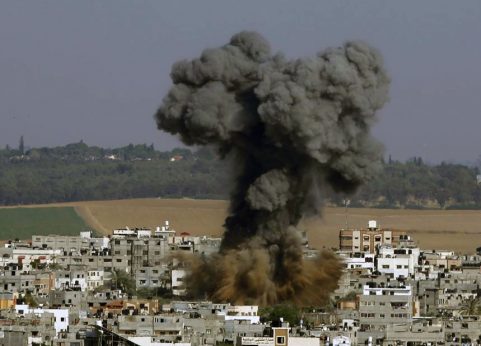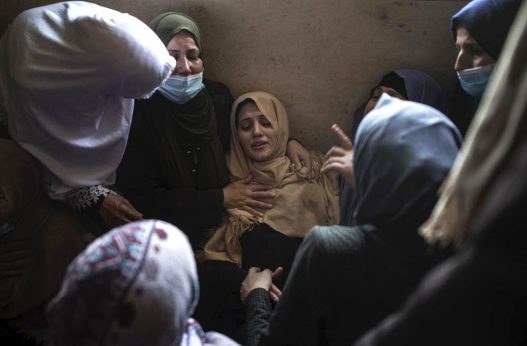
At least 26 Palestinians have been killed—including nine children and women—by Israeli military forces in just the last 24 hours. Most were killed by bombs dropped on Gaza by Israeli jets. The airstrikes came in retaliation for rockets fired by militants belonging to the Islamist group Hamas. The rockets, in turn, were a response to Israeli police attacks on Palestinians protesting a Zionist march at Jerusalem’s al-Aqsa Mosque.
Sparking the latest rounds of violence are Israel’s aggressive land grabs and stepped-up effort to expel Palestinian families from their homes in the Sheikh Jarrah neighborhood of East Jerusalem. The moves are widely seen as a prelude to Israeli ambitions to swallow up all of Jerusalem, blocking the formation of a Palestinian state with its capital in the city.
The expulsions have now been temporarily postponed by a decision of the Supreme Court of Israel to delay ruling on government plans to permanently move Israeli settlers onto the Palestinian lands in Sheikh Jarah.
Much of the mainstream press in Israel and in countries allied with the extremist right-wing government of Prime Minister Benjamin Netanyahu have referred to the stealing of Palestinian land and homes by illegal settlers as “evictions,” but Palestinians and international human rights groups say the process is part of a long-running ethnic cleansing program aimed at driving Arabs out of Jerusalem.
Most of the families living in Sheikh Jarrah have been there since 1956. They moved to the area after being expelled from their previous homes during the land thefts that made way for the founding of the State of Israel in 1948—the events known as the “Nakba,” or the Catastrophe, by Palestinians. Approximately 750,000 Palestinians out of a population of 1.9 million were kicked off their ancestral lands to make way for new Jewish immigrants from 1947 to 1949.
Israel’s deadly airstrikes on Monday were preceded by hours of fighting outside the al-Aqsa Mosque, a site sacred to both Muslims and Jews. Palestinians had gathered at al-Aqsa to protest a plan by right-wing extremists to march through Palestinian neighborhoods for the annual Jerusalem Day parade, an Israeli national holiday celebrating the conquest of Jerusalem in the 1967 Arab-Israeli War.
Israeli police attacked the protests with tear gas, stun grenades, and rubber-coated steel bullets. Ammunition was reportedly fired into the mosque itself, where people were praying as fighting raged outside. An estimated 300 or more Palestinians were hurt. Later that evening, Hamas fired rockets toward Israel in retaliation. Netanyahu then sent bombers into the skies above Gaza.

The Israeli military claimed it would only target Islamist militants, but the Gaza Health Ministry reported heavy civilian casualties, particularly in targeted apartment buildings.
Ashraf al-Kidra, a spokesperson for the ministry, told the Associated Press that Israel’s “relentless assault” was overwhelming the health care system, which is already reeling from the fight against COVID-19.
Medical supplies are constantly in short supply due to an economic blockade by Israel, and a form of vaccine apartheid continues to restrict Palestinian access to coronavirus shots. Israel has vaccinated over 60% of its population, but by the end of April, Palestine had only been able to secure enough vaccines for 3.4% of its people. Most Palestinians must wait for supplies from the World Health Organization’s Covax program for poor countries, even as their wealthy neighbor speeds back to pre-COVID normality.
These events are unfolding in the wake of the release of a comprehensively stunning report from the internationally respected non-partisan group Human Rights Watch, which unequivocally calls Israel an “apartheid” state.
Mass protests against the Netanyahu government’s military moves, meanwhile, swept both the Palestinian territories and Israeli cities Monday night.
The Palestinian People’s Party issued a statement calling for the “largest possible popular movement and mobilization” to support the people of Sheikh Jarrah “in the face of the fascist attacks” of Israeli “occupation forces and settler gangs.” The left-wing socialist party urged Palestinian authorities to secure international aid to “stop the massacre of ethnic cleansing” in East Jerusalem.
Calls for resistance against Israeli aggression also came from within Israel itself. Muhammad Barakeh, chair of the Committee for Arab Citizens of Israel, encouraged protests in all cities against the “terror of the occupation in Jerusalem.” Some 21% of the population of Israel proper is Palestinian. Barakeh is a member of the Communist Party of Israel and previously served as a member of the Knesset, Israel’s parliament.

Netanyahu’s militaristic actions are in line with his long-running stance of squeezing out Palestinians and expanding Israeli territory, but they are also wrapped up in Israel’s chaotic domestic political situation. Since inconclusive elections in March, Netanyahu has failed to hammer out a coalition arrangement with his hardline and ultra-Orthodox allies. He currently sits as a caretaker prime minister.
Heading up the defense ministry and overseeing the bombing of Gaza is one of Netanyahu’s rivals, Benny Gantz. The two share a desire for crushing Hamas, but the latest fighting may upset Gantz’s attempts to win the support of Arab parties in Israel in order to oust Netanyahu.
Though the highest organs of the Israeli state appear beset by division and confusion, in Sheikh Jarrah and across Palestine, the latest fighting appears to be uniting people. Muna al-Kurd, a 23-year-old woman living in Sheikh Jarrah, told the Al Jazeera network, “The size of the global solidarity has angered the [Israeli] government of the occupation, and the crackdown has increased. “But,” she defiantly said, “I believe in popular resistance.”










